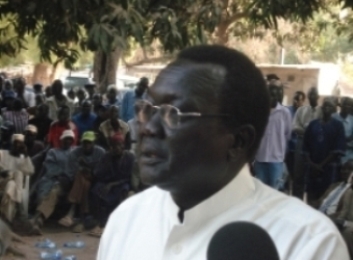S. Sudan Minister: we are determined to find resolutions with Sudan
October 1, 2012 (JUBA) – South Sudan’s minister of water resources and irrigation, Paul Mayom Akec on Monday said his nation is determined to fully resolve all outstanding issues with the government of neighbouring Sudan within shortest time possible, if Khartoum shows willingness to break the current impasses.

Akec made the remarks during an interview with Sudan Tribune on Monday. He also said that the 14 Mile no-man’s-land agreed upon by the two nations is not an indication of the demarcation of nation borders, it is a temporary arrangement “to allow the two parties to explore other ways to permanently settle the dispute.” As such, he called upon the people of South Sudan to support the deal.
Akec was one of the leading negotiating team members tasked with interpreting the legal terms of the deal. His call for support for the deal came hours before a group of Elders issued a release welcoming the deal which president Salva Kiir and his Sudanese counterpart Omar al-Bashir signed in the Ethiopian capital of Addis Ababa on 27 September.
The two countries still have to continue talks over the disputed border areas and to agree on the organization of a referendum in Abyei particularly the eligibility of Misseriya pastoralists to participate in vote.
South Sudanese officials say they want a swift decision from the African Union on Abyei, as Khartoum rejected a proposition made by the African Union mediation supporting the South Sudanese point of view and proving that only the Misseriya resident in Abei can participate in the vote.
A group of international icons for peace and justice, issued Monday a statement welcoming the agreements signed by presidents Omer Al-Bashir and Salva Kiir on 27 September in the Ethiopian capital and expressed hope that they “will build on this momentum” to address the demarcation of the borders and the status of the area of Abyei.
The Elders’ letter extended to Sudan Tribune on Monday congratulated the two presidents for reaching a compromise agreement over a number of post secession issues and explained that the lives of ordinary people in both countries could be dramatically improved by the deal which Sudan describes as “historic”.
South African activist and retired Archbishop Desmond Tutu, who acted as the Elders’ chair, said the people of South Sudan and its northern neighbour had “faced needless hardship” and that their fates “are intertwined”. He said that the agreements signed “go a very long way to building this trust, and we pray the people will start to see the benefits as soon as possible.”
Jimmy Carter, former US president, said the presidents of both nations “displayed real statesmanship by overcoming their differences and reaching compromises.”
The Elders also welcomed a key aspect of the deal; the establishment of a demilitarised zone between Sudan and South Sudan. If fully implemented, is buffer zone will go a long way towards reassuring both sides that their security will be assured.
The African Union (AU), supported by the international community as a whole, must ensure that the provisions for this buffer zone are effectively implemented and monitored, according to the Elders.
They also commend former South African president Thabo Mbeki, chairperson of the AU High-level Implementation Panel (AUHIP) for his skill and persistence in helping the two sides reach a deal and expressed hope that the leaders of the two countries will build on the current momentum to address issues relating to borders demarcation and the status of Abyei.
They also emphasised the urgent need for the conflict between the Sudan Armed Forces and the rebel Sudan People’s Liberation Movement-North (SPLM-N) to be resolved in the Sudanese states of South Kordofan and Blue Nile. On the occasion of the International Day of Peace, 21 September, The Elders called for a humanitarian truce in Blue Nile and South Kordofan to allow vital aid to reach all those affected by the violence.
(ST)
